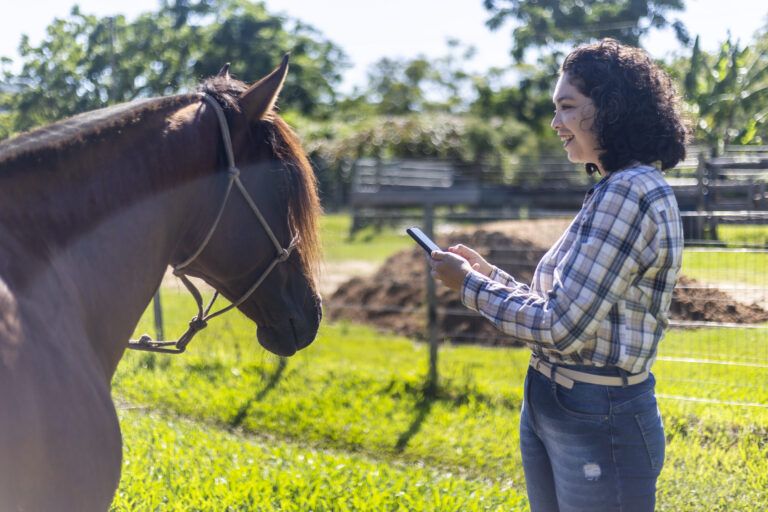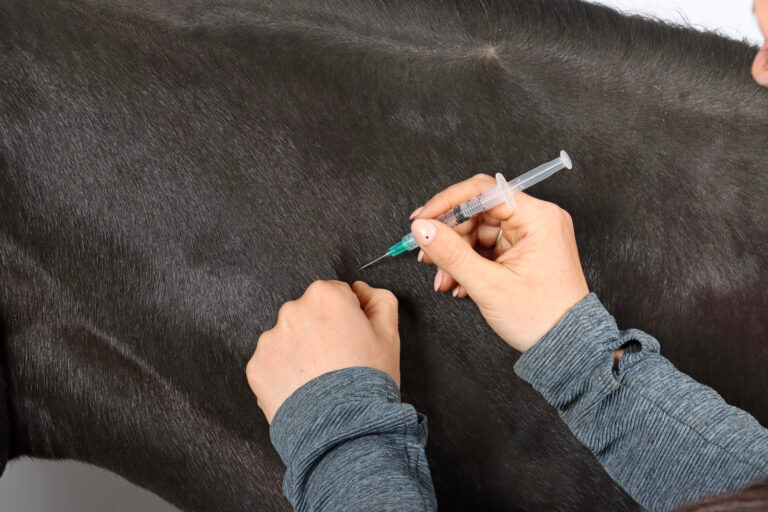
Welcome to EquiManagement’s podcast Disease Du Jour, where each podcast will delve into the research and current best practices for a variety of equine health problems with industry experts.
Listen to or download episodes of Disease Du Jour on iTunes, SoundCloud or Stitcher.
This episode’s guest is Angela Pelzel-McCluskey, DVM, MS, who is a National Equine Epidemiologist for the United States Department of Agriculture (USDA), Animal and Plant Health Inspection Service (APHIS), Veterinary Services. She is based in Fort Collins, Colorado. In this podcast she will be discussing equine infectious anemia (EIA).
Pelzel-McCluskey obtained her Doctorate in Veterinary Medicine in 2001 from Texas A&M University. In 2017, she received a Masters of Science degree in Immunology and Infectious Disease from Washington State University.
She was in equine private practice in both Texas and Colorado and has served as an epidemiologist with state and federal animal health agencies since 2004.
Pelzel-McCluskey currently oversees the federal response to reportable equine disease outbreaks nationwide and has been the lead epidemiologist for more than 30 state, regional and national disease outbreak responses during her combined state and federal service.
In this podcast we will discuss:
- What is equine infectious anemia?
- Why is this disease reportable?
- What are the clinical signs?
- How is it transmitted?
- Why do we see so much EIA in bush track racing Quarter Horses?
- What are options if you have an EIA-positive horse?
- How can veterinarians help clients avoid EIA?
Editor’s note: The AAEP published new EIA Guidelines in August 2019. Read the guidelines here.
Listen to or download episodes of Disease Du Jour on iTunes, SoundCloud or Stitcher.
Previous Episodes of Disease Du Jour
Episode 13 – Michele L. Frazer, DVM, DACVIM, DACVECC, is an Associate veterinarian at Hagyard Equine Medical Institute in Lexington, Kentucky. She discussed diarrhea in adult horses and foals.
Episode 12 – Jack Easley, DVM, MS, DABVP, DAVDC (Eq), is the owner of Easley Equine Dentistry based in Shelbyville, Kentucky. Easley talks about how much has changed in equine dentistry, the wide variety of dental diseases horses can have, the need for a good dental exam with the right tools, the use of radiographs, and what horse owners expect today in equine dental care.
Episode 11 – This episode—featuring Drs. Ernie Bailey, of the Gluck Equine Research Center at the University of Kentucky, and Samantha Brooks of the University of Florida—covers the topic of Genes as Management Tools. We discuss how genetics touches equine veterinarians on a day-to-day basis; adaptation and evolution; fragile foal syndrome; OCD; roaring; reproduction; and infectious disease.
Episode 10 – Angela Pelzel-McCluskey, DVM, MS, who is a National Equine Epidemiologist for the United States Department of Agriculture (USDA), Animal and Plant Health Inspection Service (APHIS), Veterinary Services, discusses vesicular stomatitis virus (VSV).
Episode 9 – Kent Allen, DVM, owner of Virginia Equine Imaging in Middleburg, Virginia, and co-founder of ISELP, discusses lameness diagnosis and ISELP.
Episode 8 – Roberta Dwyer, DVM, MS, DACVPM (epidemiology specialty), discusses biosecurity factors that equine veterinarians need to understand in order to best prevent and control disease spread on client farms.
Episode 7 – Martin Nielsen, DVM, PhD, DipEVPC, DACVM, one of the world’s leading equine parasitology researchers who is an associate professor at the University of Kentucky’s Maxwell H. Gluck Equine Research Center. Nielsen discusses the value of checking efficacy of dewormers; the evolution of parasites and the science surrounding them; recent papers on parasite modeling; evaluating parasite control programs, combination deworming practices and the science behind them—good and bad.
Episode 6 – Peter Timoney, MVB, MS, PhD, FRCVS, the Frederick Van Lennep Chair in Equine Veterinary Science and a Professor at the Gluck Equine Research Center at the University of Kentucky. TImoney discusses equine infectious diseases, with a focus on factors that compromise normal pregnancy and the adolescent horse.
Episode 5 – Robert Holland, DVM, PhD, a private practice veterinarian in the Central Kentucky area focusing on respiratory problems and infectious diseases, talks about Respiratory Tips from the Field.
Episode 4 – Bonnie Barr, VMD, DACVIM, an internal medicine specialist at Rood and Riddle Equine Hospital in Kentucky, talks about common neonatal problems in this podcast.
Episode 3 – Tom Chambers, PhD, who heads the OIE Reference Laboratory for equine influenza at the University of Kentucky, discusses equine influenza.
Episode 2 – Tom Riddle, DVM, DACT (hon), a founding partner of Rood and Riddle Equine Hospital in Lexington, Kentucky, discusses breeding season procedures that he has developed over his decades-long practice.
Episode 1 – Steve Reed, DVM, DACVIM, of Rood and Riddle Equine Hospital in Lexington, Kentucky, discusses equine herpesvirus and equine herpesvirus myeloencephalopathy.
Listen to or download episodes of Disease Du Jour on iTunes, SoundCloud or Stitcher.


![[Aggregator] Downloaded image for imported item #18383](https://s3.amazonaws.com/wp-s3-equimanagement.com/wp-content/uploads/2025/09/30141253/EDCC-Unbranded-29-scaled-1-768x512.jpeg)

